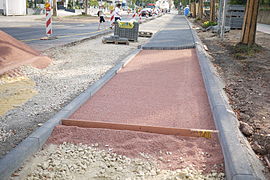In 2015, Hall County (Georgia) brought legal action against Selective Insurance Company of America, Inc., the surety company for contractor Ruby Forrest. Hall County had contracted Ruby Forrest to complete and maintain sidewalk systems within three residential subdivisions that Ruby Forrest owned and was developing. Ruby Forrest did not complete the work as promised, and Hall County brought action against the contractor’s surety to recover under performance / maintenance bonds for uncompleted work and to assert bad faith claim for punitive damages and attorney fees.
Selective Insurance did not dispute that it had issued the bonds, that Ruby Forrest did not complete the sidewalk systems within the bond periods or their extensions, or that Hall County provided Selective Insurance with timely notice of Ruby Forrest’s failure to complete the work. Instead, Selective Insurance asserted that the original claim by Hall County was time-barred under a provision in the bonds that stated that “the Issuer will have no more liability after” the expiration date of the bond.
The district court denied defendant Selective Insurance’s summary judgment motion and granted plaintiff Hall County’s summary judgment motion. The district court concluded that: (1) under a plain reading, this provision of the bond agreements was not a contractual limitations period for filing a judicial action, but rather delineated the period in which liability to Selective Insurance could accrue; and (2) alternatively, even if the provision could be read to shorten the statute of limitations period, such a reading was “inherently unreasonable” and thus unenforceable under Georgia law. The district court further noted that Selective Insurance had not argued that Hall County’s claims were barred by any statute of limitations that might be applicable. The district court determined that, absent any valid defense, Selective Insurance was bound by the terms of the bonds, and the insurance company was ordered to pay Hall County the full amount of the bonds.
Both Hall County and Selective Insurance filed appeals. After review, the appellate court found no reversible error in the district court’s entry of summary judgment in favor of plaintiff Hall County on these three performance/maintenance bond claims. The appellate court also found no reversible error in the district court’s awarding plaintiff Hall County the full amount of the bonds. The County Engineer for Hall County testified that the bond amounts were based on inspection and estimates for completing the sidewalk work at the time the bonds were issued in 2007 and that the estimated cost to complete the sidewalk work in 2015 exceeded those bond amounts. In opposing Hall County’s motion for summary judgment, Selective Insurance did not present any evidence to dispute the County Engineer’s testimony.
the district court’s entry of summary judgment in favor of plaintiff Hall County on these three performance/maintenance bond claims. The appellate court also found no reversible error in the district court’s awarding plaintiff Hall County the full amount of the bonds. The County Engineer for Hall County testified that the bond amounts were based on inspection and estimates for completing the sidewalk work at the time the bonds were issued in 2007 and that the estimated cost to complete the sidewalk work in 2015 exceeded those bond amounts. In opposing Hall County’s motion for summary judgment, Selective Insurance did not present any evidence to dispute the County Engineer’s testimony.
In addition to the three performance/maintenance bond claims, Hall County’s original complaint contained a fourth count that asserted a bad faith claim for punitive damages and attorney’s fees. Although Hall County moved for summary judgment on Count Four, the district court’s summary judgment order did not explicitly address Count Four. Nonetheless, the district court entered a final judgment in favor of Hall County “in the aggregate amount of its bond limits, $265,595.65” and terminated the case as if its summary judgment order had disposed of all the claims. In its cross appeal, Hall County argued that the district court’s summary judgment order should have addressed Count 4 explicitly.
After this appeal was filed, Hall County then filed a post-judgment motion in the district court seeking an award of a twenty-five percent penalty and reasonable attorney’s fees on Count Four. The district court denied the motion without prejudice, noting that both parties had already filed notices of appeal. The district court directed Hall County to renew its motion within thirty days after completion of these appellate proceedings. The appellate court did not address the award of any attorney’s fees and penalties but did remand to the district court to do so in the first instance.
